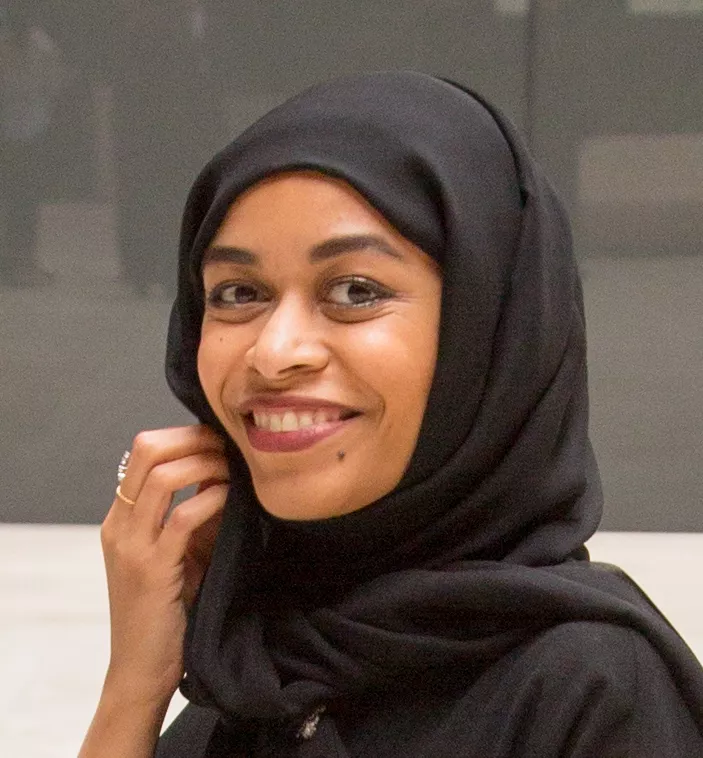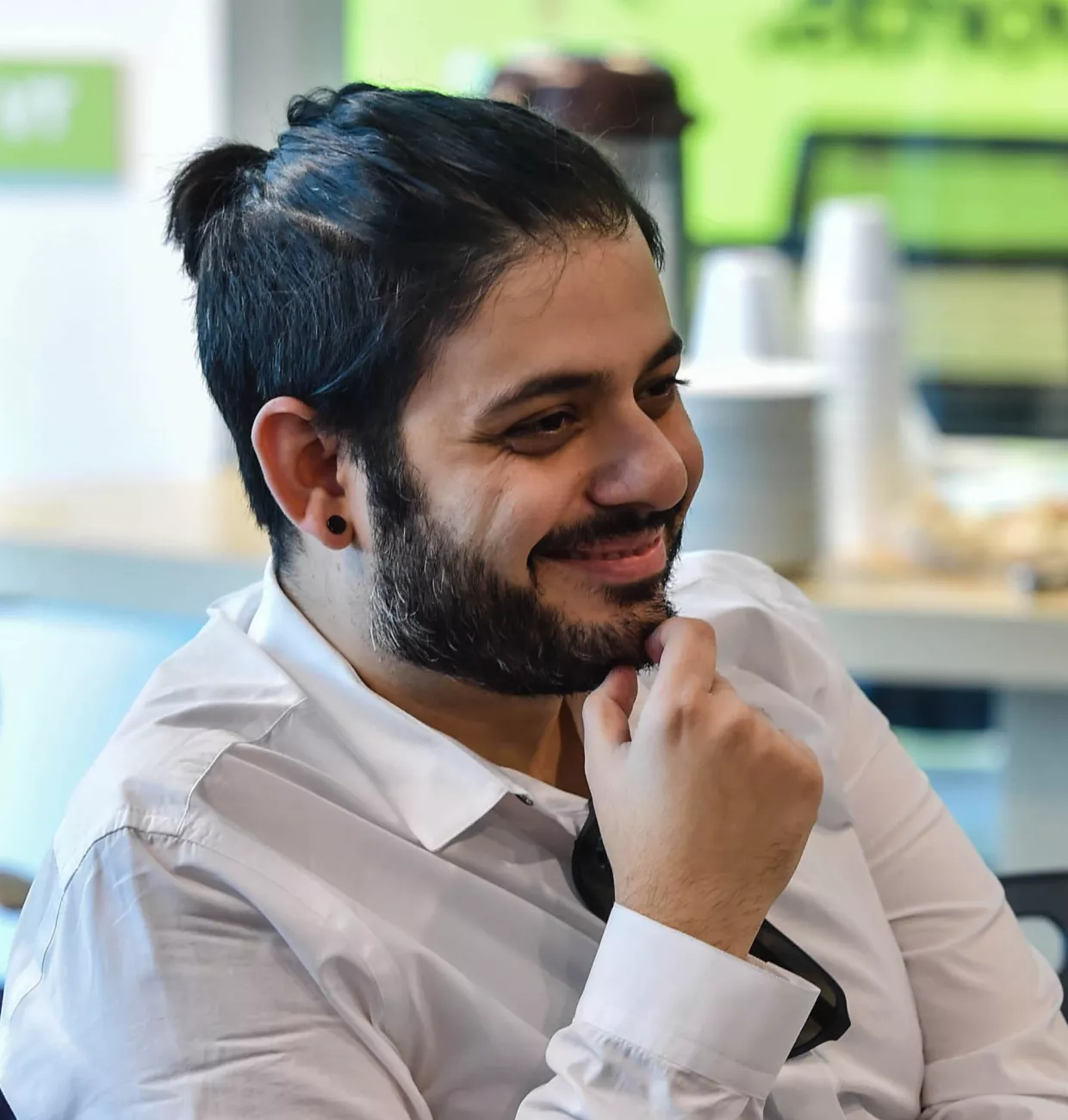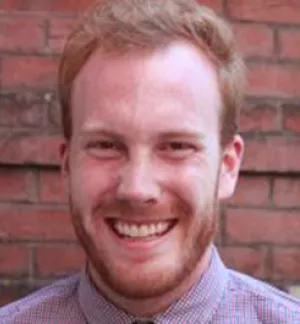
In the 2017-2018 academic year the Middle East Initiative, jointly with the Center for Public Leadership, offered funding to 15 of 67 students from the region to study at the Kennedy School. In addition to fellowship funding, MEI provides formal and informal support to students from the region, from consulting on student- led events to career counseling. With the region producing seemingly daily news headlines throughout the year, students remained remarkably active on campus and MEI continued to offer support to these emerging leaders.
We spoke with two Emirates Leadership Initiative Student Degree Fellows, Mariam Balfaqeh and Tarek Zeidan, about their time as a fellow at Harvard, and their plans after graduation. The Emirates Leadership Initiative Student Degree Fellowship was established by the United Arab Emirates to support students from the UAE and other Arab countries who have demonstrated interest in developing leadership and public management skills.
Mariam Balfaqeh
Mariam Balfaqeh, the Acting Department Manager at the General Secretariat of the Executive Council, Economic Development and Government Financial A airs Department in the Abu Dhabi Government, graduated in 2018 a er completing her one-year, mid-career Master’s in Public Administration at HKS. Before returning to the UAE in August, Mariam received a certi cate in Innovation and Technology from MIT.
Tarek Zeidan
Tarek Zeidan, a sexual and bodily rights activist from Beirut, Lebanon, graduated a er two years at HKS with his Master’s in Public Administration in 2018. He was a student fellow with both the Emirates Leadership Initiative and the Carr Center for Human Rights Policy. He has since returned to Lebanon where he will apply lessons from the Kennedy School to continue advocating for the rights and protection of LGBT individuals and communities in the MENA region.

What did being an Emirates Leadership Initiative Fellow mean to you?
MB: I looked forward to being an ELI fellow. It gave me a sense of community and provided
me with a great network. e fellowship was a safe space to ex- change ideas, debate, and express opinions with people from similar geographical backgrounds but different experiences in the region. e idea that we are all from the Arab World provided an extra layer of support to push the boundaries of collaboration.
TZ: Being part of ELI meant belonging to a group of bright, driven, dedicated young Arab women and men who invested massive amounts of effort into solving public problems endemic to the region. The fellowship provided a structure that facilitated collective thinking in a space where one felt empowered and supported to exchange ideas and implement their potential. We could disagree and debate o en but always shared the common goal of serving our communities the best we can.
The fellowship also provided access to successful and established leaders in various fields. Sitting within the Center for Public Leadership (CPL), the fellowship benefits from CPL’s history and experience in troubleshooting chronic problems and managing change.
What was your favorite course at HKS and why?
MB: Political Economy After the Crisis was one of my favorite classes. It was taught by Professor Dani Rodrik and Professor Roberto Mangabeira Unger. I remember having a conversation with a friend about how the concepts for future economies and the institutions needed to support such economies are very abstract and “up there in the clouds,” while current demands require from us something more concrete. My friend pointed out that this was exactly the point of the class, for us to build a concrete path towards the clouds. is class changed the way I look at limitations in a eld like economics and how we can be more innovative and inclusive in our approach to policy.
TZ: Global Justice with Kathryn Sikkink. is course helped me figure out the role I play as an individual activist in this gigantic, ever-evolving global community on its quest for equality and fairness. It was the first time I experienced a course that did not follow a neoliberal agenda, and one that fused economic rights with the more prevalent civil and political rights rhetoric. By focusing not only on political struggle and conflict resolution, Global Justice provided evidence based hope in the pursuit of economic justice while simultaneously reaffirming my faith in the practice and promise of Human Rights.
"The fellowship was a safe space to exchange ideas, debate, and express opinions with people from similar backgrounds but different experiences in the region."
Mariam Balfaqeh, MC/MPA '18
What was one of your most meaningful experiences outside of your coursework?
MB: Studying at Harvard provided many meaningful interactions outside of coursework. Mostly getting to know people from different backgrounds and interacting with them outside the classroom. e treks in the States and abroad provided a great opportunity for me to have a dialogue with classmates and others about the challenges people face and what values they hold. It gave me a chance, as well, to look inward and assess my own values and how I am channeling them through my work and interactions with others.
TZ: Organizing the first-ever LGBT Rights panel at the Arab Conference at Harvard (ACH). Not only was I surprised at the level of support from Arabs and Arab Alumni at the conference, but I also did not expect interest in the quest for truth about gender and sexual minorities in the Middle East and the storied role these minorities have played in the region’s history, from the dawn of civilization all the way until today.
Being surrounded by this much curiosity filled me with hope, as did the many offers of support and help from excited volunteers of the LGBT rights movement in the region. e conference started to sketch the outlines of the beginning of a partnership between Arabs in the diaspora and Arabs in the region, which is long overdue. e interactions I witnessed illustrated how both of our cultures can be greatly enriched by this exchange. However, most importantly, that event will always be etched in my memory because of the public, impromptu stories and revelations shared by the audience members in the aftermath of the panel.
The atmosphere was electric. And right there and then my belief was reaffirmed in the vast potential of my people for tolerance and equality which has long been denied and is slowly beginning to courageously re-emerge.
Mariam, you worked closely with HKS staff and colleagues in the UAE to organize the annual Policy Field Visit to the UAE. Can you speak more about that experience? What was surprising about bringing a group of Harvard students to your home and what have you learned?
MB: The experience of organizing a trek to the UAE for a group of policy students, some of whom have never been to the region, was a huge task and a great responsibility. In 10 days, I wanted to show the students my country and how I experience it, which I quickly realized is impossible. It was interesting for me to interact with the students and hear their questions and comments. People were curious and open to learn about culture, development, and policymaking mechanisms in the UAE. I was pleasantly surprised as I learnt with the group about some aspects I took for granted, the concept of having access to our leaders every week through the Majlis or by chance in a random restaurant or café. Speaking of which, the food was one of the brightest highlights of the trek and something that any Emirati and Middle Easterner would take pride in!
Tarek, you worked closely with faculty, specifically Hugh O’Doherty, on leadership frameworks and created a working group on dialogue. Can speak more about that? What motivated this work and what have you learned?
TZ: I had the extraordinary privilege to be Hugh’s course coach for the Exercising Leadership course at HKS. I was also lucky enough to be able to join him and several of my colleagues in exploring how the adaptive leadership framework can be utilized to solve protracted conflicts as an innovative approach to conflict resolution. Professor O’Doherty, who is perfectly situated for bridging these two disciplines, created a working group that sought to train students on how to use the framework to move entangled systems towards progress in solving problems within their region. I happened to be the only person from the Arab World to join the group which included individuals working on Kashmir, Myanmar, and North-South Korean relations.
I found the work we did together extremely riveting, because it reaffirmed my belief that conflict and confrontation are distinct. There is conflict among the people in our region largely due to our historical experience with the West, but also because the space for confrontation and debate has shrunk. Confrontation increases tolerance for uncertainty and gives the “other” the space to speak. It is my hope that, upon returning home, I will contribute to the establishment and revitalization of these necessary spaces so that hard problems receive the serious collective attention they deserve.
Did MEI affect your time at HKS? If yes, how?
MB: MEI provided a “home” at HKS away from home. The staff have been very helpful and supportive. It is a great resource for Arab students and those who are interested in research on the region.
"The most valuable lessons you will learn always involve taking a risk, which is richly rewarded by the amount of experience it yields."
Tarek Zeidan, MPA '2018
TZ: MEI played a pivotal role for me at HKS because it supplemented the shockingly lacking course offerings on the MENA region with indispensable public events and seminars. The academics, diplomats, and policy experts who were part of MEI’s roster of lectures provided much needed insight and analysis from the ground, and instigated necessary conversations that otherwise would not have taken place on this campus.
Examples of some of the programing that impacted me include, the seminar, “Enabling Egypt’s New Mamelukes: Global Partnering with the Military Economy” with Yezid Sayigh, Senior Associate at the Carnegie Middle East Center and Lina Khatib, Head of the Middle East and North Africa program at Chatham House talking about Syria. The latter was exceptionally important since there was a paucity of Syrian students on campus for the past 2 years. Another important seminar for me was the study group “Human Rights in the Arab Region: What Next?” led by Dr. Fateh Azzam, former director of the Asfari Institute for Civil Society and Citizenship.
What are you most looking for- ward to as an HKS graduate?
MB: I am looking forward to turning some of the ideas into projects, collaborating with professors and fellow graduates on different projects that help bridge the gaps between countries and that can have positive impact on policies, especially in the areas of entrepreneurship and leadership.
TZ: I hope to use the lessons I learned here to be of service to other people. I take the words “public service” very seriously. The investment that was made in my education must pay off , because I plan to pay forward the luck and privilege I was afforded by this experience to enter the public and non-profit sector exclusively. When I return home, I look forward to sharing what I’ve learned with the people who I hope to join in the fight.
What advice would you give to incoming students?
MB: Immerse yourself in this experience, keeping in mind what you want to gain. Ask for help, and surround yourself with the support system that enables you to achieve what you want. And finally, give yourself permission to change your mind about what you really want!
TZ: The real education at HKS happens outside of and between classes. The most valuable lessons you will learn always involve taking a risk, which is richly rewarded by the amount of experience it yields. Get involved in and initiate events, discussions, and dialogues with centers and student groups, especially those whose politics and value systems differ from your own.
I strongly advise you to go to every event you can. If you don’t like the events you see and you think certain topics are missing, then organize something yourself! HKS provides you with a launch pad - it’s an incubator that allows you to take risks and test ideas in a controlled environment before you go back to implement them when you return home. Speaking of which, I also advise that you consider organizing student treks to your home country to offset the misinformation and stigma around our part of the world and to make a seriously lasting impression on your fellow colleagues and contribute to their education - they will undoubtedly contribute to yours.
Read the full 2017-2018 Mosaic
<p>This article appeared in MEI's 2017-2018 Mosaic. The full issue of Mosaic can be found here!</p>
“We Are Here.” Mawhorter, Christopher, ed. December 20, 2018


